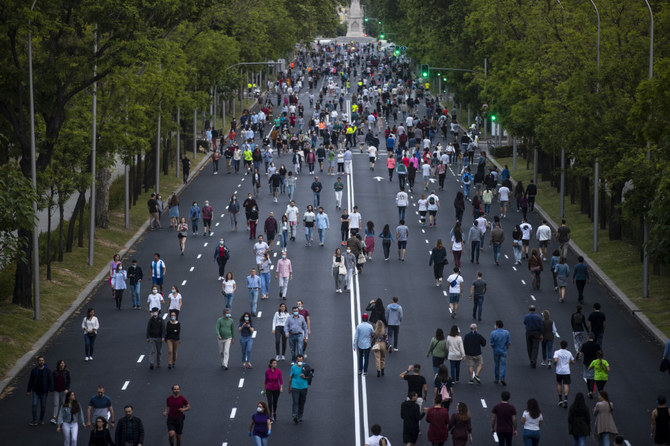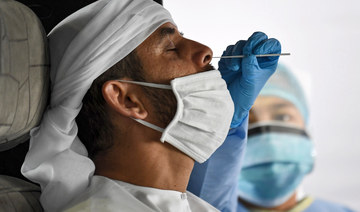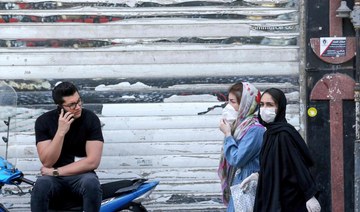PARIS: People in France and Spain, two of the countries hardest hit by the coronavirus pandemic, were preparing Sunday for an easing of lockdown rules as the global number of infections surpassed four million.
In the US, the country with the world’s highest death toll, President Donald Trump faced sharp criticism from his predecessor Barack Obama who said on a leaked tape that Trump’s handling of the crisis was an “absolute chaotic disaster.”
The virus has claimed more than 78,000 lives in the United States, which has recorded more than 1.3 million infections, according to a tally by Johns Hopkins University.
Worldwide, the death toll has surged past 277,000 and the number of coronavirus cases surpassed four million on Saturday, according to an AFP tally.
Lockdowns and economic disruption, meanwhile, have pushed millions into unemployment in a historic global downturn.
Amid the barrage of deaths, some European countries cited signs of progress they said justified taking slow steps back toward some version of normality.
French officials on Saturday said the day’s death toll of 80 was the lowest since early April. Nursing home fatalities also fell sharply as France prepared to relax curbs on public movement imposed eight weeks ago.
The easing, to begin Monday, has brought mixed reactions.
“I’ve been scared to death” about the reopening, said Maya Flandin, a bookshop manager from Lyon. “It’s a big responsibility to have to protect my staff and my customers.”
French health officials warned that “the epidemic remains active and is evolving,” and a state of emergency was extended to July 10.
In Spain, about half the population will be allowed out on Monday for limited socialization, and restaurants will be able to offer some outdoor service as the country begins a phased transition set to last through June.
Fears lingered, however, of a viral resurgence if restrictions are lifted too quickly, and authorities excluded Madrid and Barcelona, two COVID-19 hotspots, from the first-phase easing.
“The virus has not gone away,” Prime Minister Pedro Sanchez warned.
Belgium is easing some restrictions on Monday, and in some parts of Germany bars and restaurants reopened on Saturday with further easing set for Monday.
One district in Germany’s western North Rhine-Westphalia state remained locked down, however, after an outbreak at a slaughterhouse.
Overall, the situation in Europe was still far from normal.
Britain is reportedly planning to announce on Sunday that all overseas visitors will face a mandatory two-week quarantine, and the European Union warned against opening borders to travelers from outside the bloc.
Across Europe, commemorations marking 75 years since Nazi Germany’s surrender were canceled or scaled down.
In Russia, a soaring number of coronavirus infections forced Moscow on Saturday to pare back traditionally rousing World War II victory celebrations. President Vladimir Putin instead gave a solemn speech at a memorial outside the Kremlin walls, without mentioning the coronavirus.
Russia is now the fifth hardest-hit country, with nearly 200,000 confirmed infections and a rapidly rising caseload.
Trump's handling of crisis slammed
Global economic figures are pointing to the most acute downturn in nearly a century as the pandemic forced businesses to shutter and badly disrupted supply lines.
Trump, facing re-election in November, has insisted next year would be “phenomenal” for the US economy, urging reopening in a country where the coronavirus continues to claim well over 1,000 lives daily.
The United States alone lost an unprecedented 20.5 million jobs in April, driving the unemployment rate to 14.7 percent — the highest level since the Great Depression of the last century.
The numbers came as a leaked audio emerged in which former president Obama launched a scathing attack on Trump’s handling of the crisis.
In the recording, first obtained by Yahoo News, Obama urges former staffers to rally behind his former vice president, Joe Biden, who is preparing to take on Trump at the polls.
The US response to the crisis, Obama said, “would have been bad even with the best of governments. It has been an absolute chaotic disaster” under the current administration.
Pakistanis happy as lockdown ends
In Pakistan, the world’s fifth most-populous country, the government ended the lockdown on Saturday and locals streamed into markets and shops, despite still-high infection rates.
“We are happy with this decision, but at the same time I have a fear in my heart that if this disease spreads it could be devastating,” said Tehmina Sattar, shopping with her sister and sons in Rawalpindi.
Meanwhile Brazil, the country hardest-hit by coronavirus in Latin America, passed the milestone of 10,000 deaths on Saturday. It has now recorded 10,627 deaths and 155,939 infections, the Ministry of Health said.
With its auto manufacturing industry idle and other economic indicators in the red, a government minister warned this week the country faced “economic collapse” if lockdowns continue.
Dire data from many countries has further dampened the already grim global outlook, with the International Monetary Fund (IMF) saying it had been too optimistic when it predicted the world economy would contract by three percent this year.
“Incoming economic data for many countries is below our already pessimistic assessment for 2020,” said IMF chief Kristalina Georgieva, whose organization is fielding dozens of requests for emergency loans.
China says response not good enough
The virus has prompted widespread soul-searching. China, facing intense criticism over its handling of the crisis, was the latest to admit to an inadequate response.
“The novel coronavirus outbreak was a big test that revealed China still has shortcomings in its major epidemic prevention and control system (and) public health systems,” Li Bin, deputy director of the National Health Commission, said Saturday.
The Trump administration has repeatedly criticized China for being secretive when the virus first emerged in the city of Wuhan late last year.
The feud spread to the UN Security Council on Friday, where the US — reportedly out of frustration with China and the World Health Organization — prevented a vote on a resolution calling for a cease-fire in various conflicts to allow officials to focus on the pandemic.
























